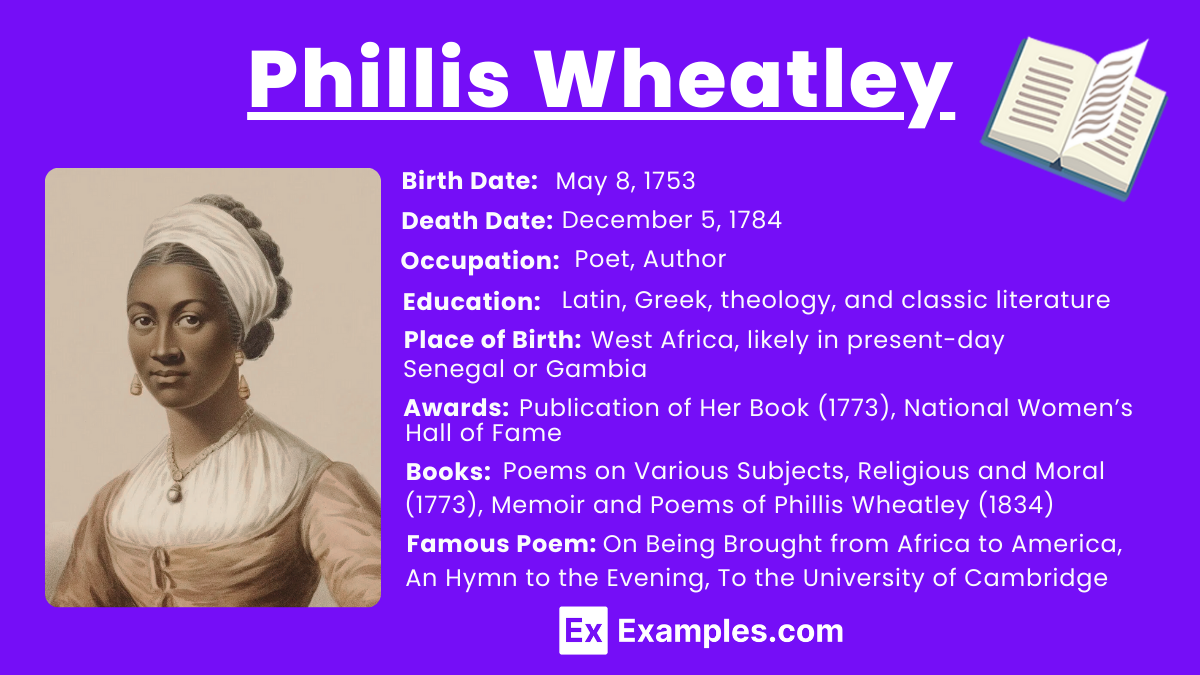Phillis Wheatley Poet – 5 Famous Poems and Biography
Introduction of Phillis Wheatley (c. 1753-1784) :
Phillis Wheatley (c. 1753-1784) was a pioneering African American poet whose work holds a significant place in American literature. Born in West Africa and sold into slavery as a child, she was brought to Boston, Massachusetts, where the Wheatley family purchased her. Recognizing her remarkable intellect, the Wheatleys provided her with an education uncommon for women, especially enslaved individuals, at the time. Wheatley quickly mastered English, Latin, and Greek, and began writing poetry that garnered widespread acclaim.
In 1773, she published her first and only volume of poetry, “Poems on Various Subjects, Religious and Moral,” making her the first African American woman to publish a book of poetry. Her work often addressed themes of freedom, religion, and morality, reflecting both her personal experiences and the broader issues of her time. Despite the challenges of her status as an enslaved person, Wheatley’s literary achievements challenged prevailing notions of race and intelligence and paved the way for future generations of African American writers.
Famous Poems by Phillis Wheatley
1. On Being Brought from Africa to America
‘Twas mercy brought me from my Pagan land,
Taught my benighted soul to understand
That there’s a God, that there’s a Saviour too: …….
Soon as the sun forsook the eastern main
The pealing thunder shook the heav’nly plain;
Majestic grandeur! From the zephyr’s wing, …..
3. To the University of Cambridge
While an intrinsic ardor prompts to write,
The muses promise to assist my pen;
‘Twas not long since I left my native shore …..
Thy various works, imperial queen, we see,
How bright their forms! how deck’d with pomp by thee!
Thy wond’rous acts in beauteous order stand, …..
I.
Adieu, New-England’s smiling meads,
Adieu, th’ flow’ry plain:
I leave thine op’ning charms, O spring,
And tempt the roaring main. ……
Phillis Wheatley Biography
Early Life
Phillis Wheatley was born around 1753 in West Africa, likely in present-day Senegal or Gambia. At about seven or eight years old, she was captured and sold into slavery. In 1761, she was purchased by the Wheatley family of Boston, Massachusetts, who gave her their surname. The Wheatleys recognized her intelligence and provided her with an education, which was rare for enslaved individuals at the time.
Education and Literary Development
Under the tutelage of the Wheatley family, Phillis learned to read and write English within 16 months of her arrival in America. She also studied Latin, Greek, theology, and classic literature, showing remarkable aptitude. By her early teens, she was writing poetry that reflected her classical education and Christian faith.
Literary Achievements
While Phillis Wheatley did not receive formal literary awards as we know them today, her achievements and recognition during her lifetime and posthumously include:
- Publication of her first poem in 1767 in a Newport, Rhode Island newspaper.
- Gained significant recognition with the publication of “On the Death of the Rev. Mr. George Whitefield” in 1770.
- First African American woman to publish a book of poetry with “Poems on Various Subjects, Religious and Moral” in 1773.
- Recognition and patronage from prominent figures such as George Washington, who praised her work.
- Honored posthumously with numerous scholarly studies and celebrations of her work and contributions to American literature and history.
- Induction into the Women’s Hall of Fame in 2002.
- Featured on a U.S. postal stamp in 1993 as part of the Black Heritage series.
How did Phillis Wheatley Die
Phillis Wheatley died on December 5, 1784, at the age of 31. Her later life was marked by significant financial difficulties and personal hardships. After her emancipation, she married John Peters, a free African American, but their marriage was fraught with economic struggles. The couple faced extreme poverty, and Wheatley experienced the loss of two children, which added to her distress. It is believed that she died of complications related to childbirth or a related illness, living in poor conditions and without sufficient support. Her untimely death ended the life of a pioneering poet whose contributions to American literature remain profound.



